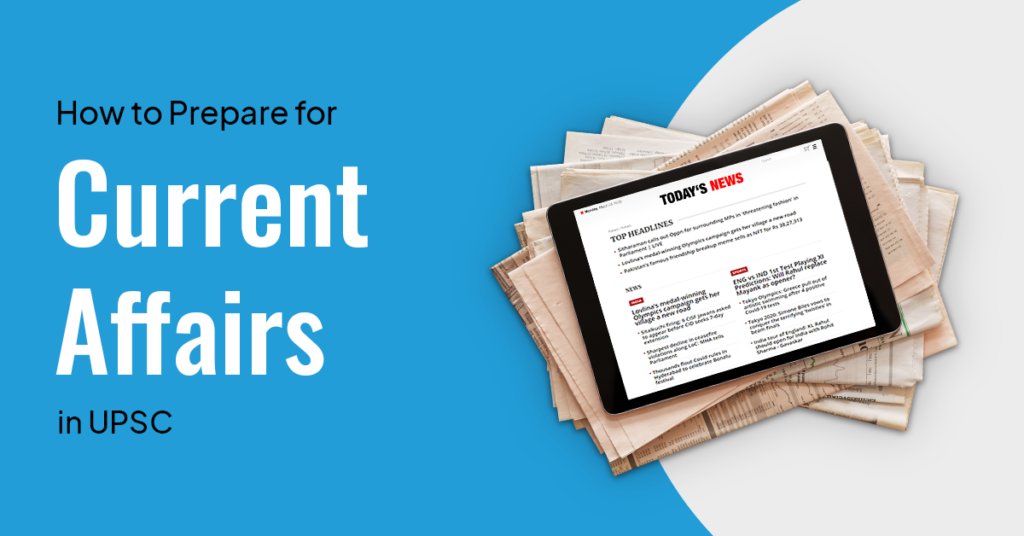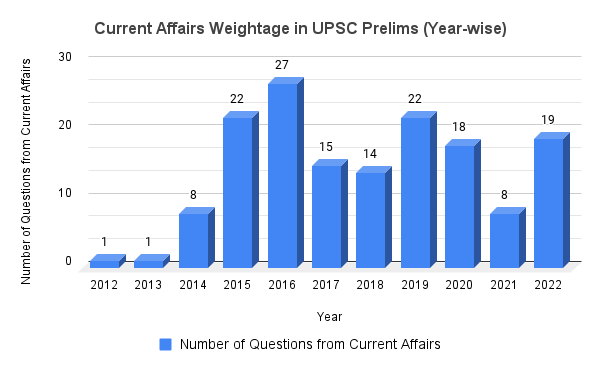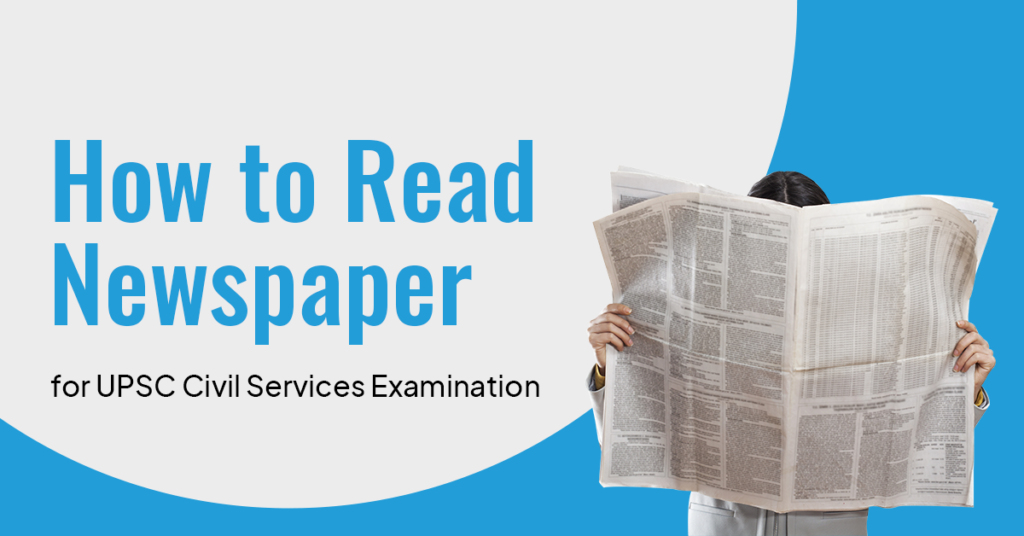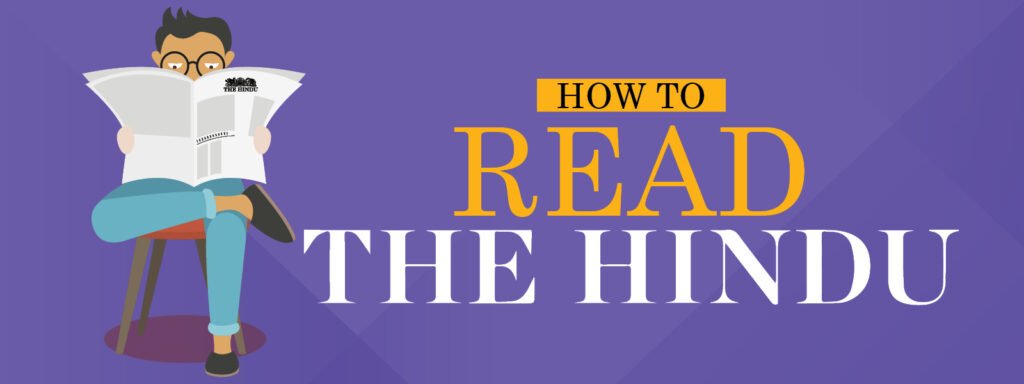How to Prepare Current Affairs for UPSC ?

Current Affairs play a significant role in UPSC Civil Services Exam preparation as the dynamic questions appear in all three stages of the examination- Prelims, Mains, and Interview. The Questions may be directly or even indirectly linked to the static part of the syllabus. Trend analysis of past years’ question papers shows that the weightage for current affairs questions is increasing every year and hence, aspirants should give more importance to current affairs and related aspects while preparing for UPSC.
Though current affairs are important, there is not exactly a detailed & defined syllabus of current affairs for both stages prelims and mains examination of UPSC civil service exam. The prelims syllabus just mentions, “Current events of national and international importance”. Therefore the candidates must analyse past years’ question papers of both prelims and mains to get an idea of how much weightage is given to current affairs, how many questions are asked and how current affairs are interlinked to different topics of the syllabus. This will help the candidates to approach current affairs with the right strategy.
Importance Of Current Affairs Preparation For UPSC ?
Tip 1: Choose Authentic Current Affairs Sources For UPSC
The most essential part in answering how to prepare for current affairs for UPSC is to choose what are the most reliable sources of information for updating your knowledge bank for current affairs in UPSC.
Some of the best sources for preparing for current affairs are:
- Newspapers,
- Monthly Current Affairs Magazines, and
- AIR Discussion / Spotlight
- PIB
The best current affairs strategy for UPSC is to limit the sources when preparing for the UPSC’s current affairs section, and multiple revisions of those sources are advised.
The list of Primary, Secondary, and UNITED LIBERAL FOUNDATION sources that can be studied to prepare for the UPSC current affairs exam is provided below.
| Sources For Current Affairs Preparation For UPSC | |
| Primary Sources |
|
| Secondary Sources |
|
| UNITED LIBERAL FOUNDATION Sources | |
Tip 2: Focus More On Analysis
- An essential component of the UPSC prelims and main examinations is current affairs. Every year, the UPSC asks questions about current events, however in order to answer, you must have a solid foundation of knowledge and be conceptually clear.
- It is not necessary to concentrate on rote memorization of current events; an aspirant also needs to comprehend the logic and relevance of the themes and situations, in addition to memorizing the facts.
- For example, if there is news on Prime Minister Narendra Modi inaugurating a circuit house near Somnath Temple. Then, it’s crucial to study the Somnath Temple’s facts and figures. The aspirants should check the backward linkages of the news. In this instance, it’s significant to understand the historical references to the Somnath Temple as well as other significant historical events.
Tip 3: Learn To Link One Topic with Another
- Linking one current issue with other static topics is a good current affairs strategy for UPSC.
- A candidate should learn how to be curious about learning more and to look for information on the subject.
- For instance, a candidate should learn how to find all the information on vaccines. If the subject of discussion is the covid-19 vaccine, applicants should read up on other vaccinations like hepatitis, pneumococcal, and Sputnik V vaccines as well as the serum institute of India, covaxin, pathogen-based vaccines, and vector-based vaccines.
Tip 4: Strategically Read Newspapers
- In order to strategize how you read newspaper articles for UPSC current affairs preparation, you need to know that your main area of focus should be on the issues that are in news, you also need to find out why the issues are in the news, and why it is a problem!
- Then you need to study some background information which will involve going through facts and stats. You will have to check the current status of the issue – Is it the same? Has any action been taken for or against it?
- Never indulge in understanding one perspective of the news. You need to go through both the pros and cons of the news.
Check out Strategy for How to Read The Hindu Newspaper here!
Check out Startegy for How to Read Indian Express Newspaper here!
Tip 5: Read Current Affair Magazines
- Similar to Newspapers, there are several magazines in the market to start current affairs preparation for the UPSC exam, but you should not pressurize yourself in reading all the current affairs magazines.
- Get hold of a few current affairs magazines that provides authentic easy-to-read information from the perspective of the UPSC exam.
- Some of the popular magazines for UPSC current affairs preparation are Yojana Magazine, Kurukshetra magazine, and Economic and Political Magazine.
- You can also Read Our Gist of Monthly Magazine
Also, check out the Gist of Yojana Magazine for UPSC here!
Also, check out the Gist of Kurukshetra Magazine for UPSC here!
Step 6: Make Topic & Date Wise Notes
- The next thing that you need to do in order to strategize your current affairs preparation for UPSC is that you need to indulge yourself in making notes.
- Notes are vital because when you write down an important event, you make sure of the spelling, you learn a bit, and you also have all the crucial events arranged date-wise for an effective revision before exams.
- Always make sure that the notes you make are arranged date-wise and also arranged subject-wise. That makes your preparation more organized and easier for revision.
- Use pointers, mind maps, and flow charts for note-making and organize all your notes in one place.
Tip 7: Highlight Important Keywords
- Always pay attention to keywords in news, articles, and reports. This is another important strategy for how to cover current affairs for UPSC exams.
- Whenever you are making notes, highlight these keywords so that when you are revising or preparing a short note, you have all the keywords in your mind which will help you in highlighting all the important points.
Tip 8: Focus on Important Issues, Not News!
- You should know that there are people who spend hours reading the same news from different sources. Moreover, not everyone who reads multiple sources gives full attention to them. This only wastes your time. What you need is a minimum number of reliable sources that cover all important events for various topics.
- You, therefore, need to focus on quality and not on quantity. Everything you read in a newspaper is not always important for UPSC.
- You need to curate your content by excluding topics that are not required for your UPSC preparation like entertainment, detailed analysis of the share market, all sports news, etc.
Tip 9: Revise and Execute
- Revision is the most essential part of UPSC’s current affairs preparation. Every day new information gets added to the particular news/issue, so you need to keep revising all the important events that you have been studying on a daily and weekly basis.
- The best way to revise for UPSC Current Affairs is to take mock tests that will help you in checking your level of preparation and will also help you in learning all that you might have missed or forgotten.
Summary :
Preparing for current affairs for the UPSC (Union Public Service Commission) exam requires a systematic approach and consistent effort. Here are some steps to help you prepare effectively:
- Newspapers and Magazines: Read a reliable newspaper daily to stay updated with current events and issues. Focus on newspapers like The Hindu, The Indian Express, or The Times of India. Magazines like Yojana, Kurukshetra, and Frontline can also provide in-depth analysis.
- UPSC-specific Sources: Refer to UPSC-specific sources like the Press Information Bureau (PIB), Rajya Sabha TV, Lok Sabha TV, and the official website of the Ministry of Information and Broadcasting. These sources provide authentic information on government policies, initiatives, and major events.
- Current Affairs Compilations: Use monthly current affairs compilations from reliable sources like Current Encyclopedia Monthly Magazine of UNITED LIBERAL FOUNDATION . These compilations summarize important events and issues, making it easier for you to revise.
- Focus on National and International Issues: Cover a wide range of national and international topics such as politics, governance, economy, science and technology, environment, social issues, international relations, and security. Make sure to analyze them from various perspectives.
- Government Reports and Surveys: Study important government reports like the Economic Survey, Budget, and the India Year Book. These documents provide valuable insights into government policies, schemes, and trends.
- Note-taking and Revision: Maintain a separate notebook or digital file to note down important current affairs points. This will help you revise effectively closer to the exam date. Make a habit of regularly revisiting your notes to reinforce your knowledge.
- Analyze Editorials and Opinion Pieces: Read editorials and opinion pieces from newspapers to understand the various viewpoints on significant issues. This will enhance your analytical skills and provide diverse perspectives on topics.
- Current Affairs Quiz and Mock Tests: Solve daily or weekly current affairs quizzes available on UNITED LIBERAL FOUNDATION Website. Additionally, attempt UPSC-specific mock tests to assess your knowledge and improve your speed and accuracy.
- Group Discussions and Debates: Engage in group discussions and debates with fellow aspirants or mentors to exchange ideas and gain different perspectives. This will improve your understanding of complex issues and enhance your communication skills.
Current Affairs Weightage in UPSC Mains GS
Current Affairs is an important part of UPSC mains because it has high weightage in the exam. Every year UPSC asks questions related to current affairs in all 4 papers of general studies in UPSC mains. Around 60-70% of questions will be relevant to national & international current events. Here we will discuss the weightage of current affairs in all the general studies papers of UPSC.
| Paper Name | Current Affairs Weightage in UPSC Mains GS Papers |
| GS Paper 1 | In this section, current affairs-related questions are asked from the geography and social issues-related subjects. Every year 5-6 questions each carrying 10 or 15 marks are asked. |
| GS Paper 2 | In GS paper 2 the majority of questions are current affairs related. It carries 250 marks. The current affairs-related question is asked from subjects such as polity, governance, international relations, and social justice. |
| GS Paper 3 | In this section, current affairs questions are asked from economics, environment, science & technology, and internal security. The total paper carries 250 marks and has a high weightage related to current affairs. |
| GS Paper 4 | Current affairs-related questions are asked in GS paper 4. It is a maximum 250 marks paper. Every year 3-4 questions carrying 10-15 marks each are asked in the GS paper-4. |
Remember, current affairs preparation is an ongoing process. Stay consistent, revise regularly, and analyze events critically. By following these steps and maintaining a disciplined approach, you will be well-prepared to tackle the current affairs section of the UPSC exam.
Good luck!
UPSC Current Affairs Preparation – FAQs
|
Q. How can I prepare for UPSC current affairs without reading the newspaper? UNITED LIBERAL FOUNDATION is the best way to prepare for UPSC current affairs even without reading the newspaper. Visit our Website Daily for the FREE Current Affairs Notes & Daily AIR Debate Q. How many months are required to prepare for UPSC CSE Current Affairs? Candidates should be prepared with the current affairs for at least 2 years. But this is not fixed. Current affairs from 2 years before can also be questioned. Q. Why should I take the UNITED LIBERAL FOUNDATION Weekly Current Affairs Mock Test? The UNITED LIBERAL FOUNDATION Weekly FREE Current Affairs Mock Tests extensively cover current affairs questions from all topics. These tests are available in 14 Indian Languages . You can attempt our Mock Test in any Indian Languages by using Translate Now Button . All the answers are available for every test with reliable sources of information. It is the best way to evaluate what you have been studying and helps you in learning new information. |


